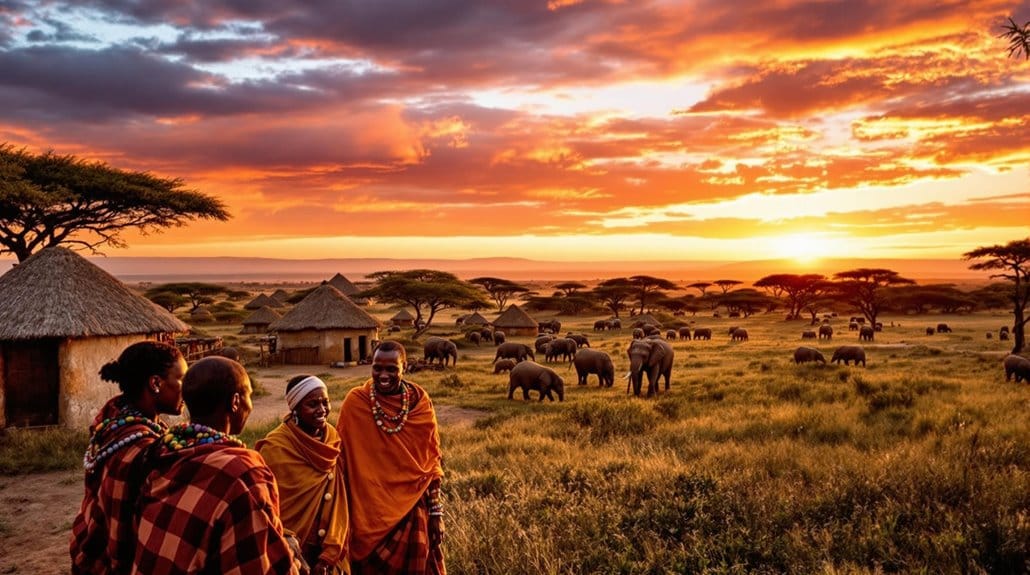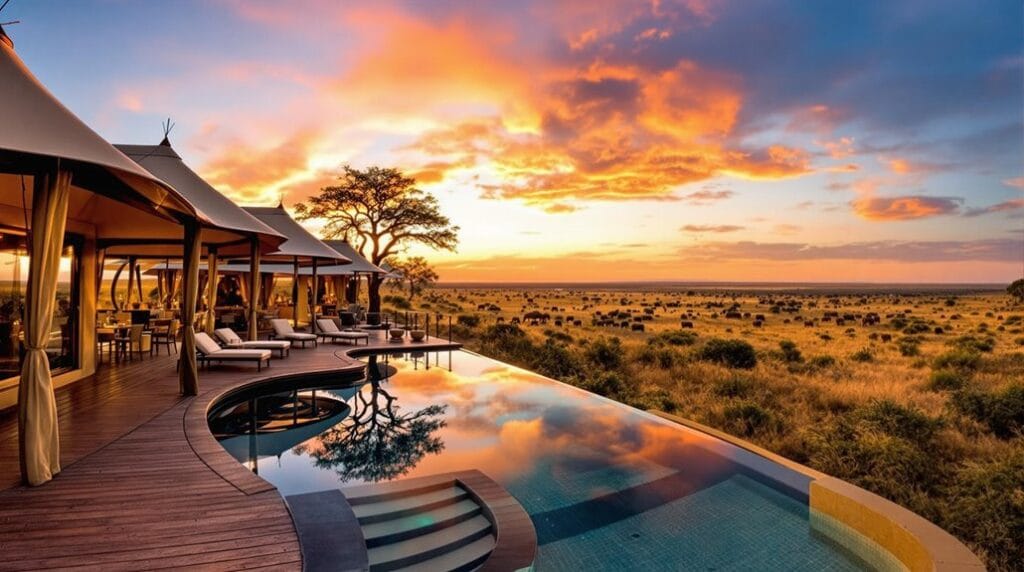In Kenya, you'll experience a vibrant mix of cultural journeys and eco-friendly safaris that respect both the environment and local communities. Eco-conscious travel operators focus on conservation, ensuring your wildlife encounters are ethical and meaningful. Stay in eco-certified lodges that utilize renewable energy and support local projects through tourism profits. Participate in community engagement initiatives, bringing you closer to the Maasai and Samburu cultures. With responsible travel practices in place, you can contribute to preserving the landscape and wildlife. Discover how your adventure can be both enriching and sustainable as you explore this amazing African destination.
Key Takeaways
- Explore cultural journeys that connect travelers with indigenous communities, enhancing understanding of local traditions and customs while promoting responsible tourism.
- Participate in eco-friendly safaris that prioritize wildlife conservation and minimize environmental impact through sustainable practices and ethical interactions.
- Stay at eco-certified lodges offering renewable energy solutions and efficient water management, ensuring a comfortable yet sustainable accommodation experience.
- Engage in community-based tourism initiatives that support local economies, providing employment opportunities and benefits for Maasai and Samburu communities.
- Join tour operators that encourage responsible travel practices, including maintaining distance from wildlife and supporting local artisans through souvenir purchases.
Eco-Conscious Tourism in Kenya
When you think about eco-conscious tourism in Kenya, you envision a journey where adventure meets responsibility.
You're not just a traveler; you're a part of a movement that emphasizes sustainable practices and supports local communities. Opting for an eco-friendly safari means choosing safari operators like Eco Adventure Safaris that prioritize conservation efforts in Kenya. They offer ethical wildlife experiences, ensuring your adventure contributes positively to the environment.
As you explore, you'll engage in meaningful cultural interactions with indigenous peoples, learning about their traditions and how they protect their land. The country's conservancies, managed by these communities, generate economic benefits through responsible travel while safeguarding wildlife.
You'll feel the impact of your choices, knowing that your visit helps fund local schools and health facilities through initiatives like "Pack for a Purpose."
Every step you take in this enchanting land supports community projects that uplift local residents and foster a deep connection to the natural world.
Sustainable Accommodation Options
As you begin your eco-friendly safari in Kenya, choosing sustainable accommodations enhances your experience while minimizing your environmental impact.
Opt for eco-certified lodges like Tortilis Camp or Amboseli Serena Safari Lodge, where eco-friendly materials and renewable energy systems are used to create a harmonious blend with nature. These lodges not only provide comfort but also implement efficient water and waste management systems, ensuring responsible resource usage throughout your stay.
Whether you're seeking budget-friendly options or luxury eco-lodges, there's something for every traveler. Lodges like Naishi Guest House and Sarova Lion Hill Lodge not only offer cozy retreats but actively participate in conservation initiatives and community support programs, allowing you to connect deeper with the local culture.
During peak seasons, it's wise to reserve your sustainable accommodations in advance to secure your preferred lodging experience.
Wildlife Conservation Efforts
Kenya's wildlife conservation efforts are an essential part of its commitment to protecting the country's rich biodiversity. When you initiate eco-friendly safaris, you directly contribute to various initiatives that safeguard great wildlife.
Organizations like Kenya Wildlife Services and the Sheldrick Wildlife Trust play pivotal roles in these efforts, focusing on education and local conservation.
Consider these impactful aspects of wildlife conservation in Kenya:
- The Ol Pejeta Conservancy actively protects the last two northern white rhinos through anti-poaching initiatives.
- Local communities engage in community-based tourism, creating economic benefits while promoting wildlife protection.
- Safari fees you pay support local non-profit partners, ensuring funds go directly to conservancies.
- The Oceanic Society collaborates with communities to foster sustainable marine practices, preserving Kenya's oceans.
Community Engagement Initiatives
Community engagement initiatives in Kenya play an important role in empowering local populations while fostering a deeper connection between travelers and the communities they visit. By participating in these initiatives, you can make a significant impact while enjoying your adventure. Organizations like Pack for a Purpose partner with local projects, such as Boresha Maisha ya Mtoto Mkenya Children Home, ensuring that your contributions reach those in need.
Many eco-lodges and safari camps allocate part of their profits to crucial community services, directly supporting education and healthcare. Programs like Go Granny Go help women establish small businesses, promoting economic independence while enhancing local entrepreneurship. Tour operators often encourage you to engage in community projects, providing opportunities to bring supplies and donations that uplift families and children.
Here's a snapshot of community engagement efforts:
| Initiative | Impact Area | Local Beneficiaries |
|---|---|---|
| Pack for a Purpose | Education & Health | Children & Schools |
| Eco-lodges Profits | Conservation Efforts | Local Communities |
| Go Granny Go | Economic Independence | Women Entrepreneurs |
| Tour Operators' Donations | Community Projects | Families & Children |
| Local Employment | Tourism Revenue | Maasai & Samburu |
Through these initiatives, you can experience the rich culture of Kenya while making a lasting difference.
Responsible Travel Practices
When commencing your Kenyan safari adventure, embracing responsible travel practices guarantees that you not only enjoy the breathtaking landscapes and diverse wildlife but also contribute to the preservation of this magnificent environment.
By being mindful of your actions, you can help assure that future generations can experience the beauty of Kenya's national parks and endangered species.
Here are some essential responsible travel practices to keep in mind:
- Maintain a distance of at least 25 meters from wildlife to preserve their natural behaviors.
- Minimize noise during game drives to reduce stress on animals and their habitats.
- Avoid feeding wild animals to prevent dependency and encourage natural feeding habits.
- Support local economies by purchasing locally crafted souvenirs instead of mass-produced items.
Frequently Asked Questions
What Are the Best Times to Visit Kenya for Cultural Journeys?
The best times to visit Kenya for cultural journeys are during the vibrant cultural festivals, typically held from June to October.
You'll experience traditional dances, savor local cuisine, and engage with indigenous tribes.
Explore historical sites, wander through artisan markets, and participate in storytelling sessions.
Don't miss community workshops that highlight wildlife conservation efforts and cultural exchange, creating unforgettable connections with the rich heritage and warm spirit of the Kenyan people.
How Can I Prepare for a Cultural Safari Experience?
Imagine stepping into a vibrant tapestry of culture, where each thread tells a story.
To prepare for a cultural safari experience, immerse yourself in local cuisine and engage with communities. Participate in village tours and art workshops, embracing traditional crafts and indigenous storytelling.
Join in festival participation to feel the rhythm of life. Prioritize sustainable practices and learn about wildlife conservation, as your journey becomes a shared celebration of heritage and connection.
Are There Age Restrictions for Eco-Friendly Safaris?
When planning an eco-friendly safari, age requirements can vary by provider. Many family safaris cater to children with engaging activities, while others focus on senior travelers, ensuring health considerations are addressed.
Wildlife interactions often have safety measures in place, and tour guides prioritize cultural sensitivity.
You'll find that safari accommodations are designed to welcome all ages, making it easy for everyone to experience the beauty and adventure of the wild together.
What Cultural Etiquette Should I Be Aware of in Kenya?
In Kenya, understanding cultural etiquette enriches your experience. When greeting locals, a firm handshake and eye contact show respect. Gift giving is appreciated, especially small tokens.
Dress modestly to honor local customs, and learn basic Swahili phrases to connect. During meals, wait for everyone to start before eating.
Respect personal space and be mindful of public behavior. Photography guidelines vary, so ask permission.
Finally, recognize social hierarchy, especially when negotiating or engaging in conversations.
Can I Participate in Local Traditions During My Visit?
Did you know that over 40 distinct ethnic groups thrive in Kenya, each with unique traditions?
You can absolutely participate in local customs during your visit. Engage in community interactions by attending traditional ceremonies or cultural festivals.
Join artisan workshops to learn crafts, experience indigenous storytelling, or enjoy vibrant music performances.
Immerse yourself in culinary experiences, take part in dance workshops, and explore village tours to truly connect with the rich tapestry of Kenyan culture.
Conclusion
As you commence your cultural journey through Kenya, remember that every step you take can leave a gentle footprint on the earth. By choosing eco-friendly safaris and supporting local communities, you're not just witnessing the beauty of this land—you're becoming a part of its story. So, let your adventures weave together the threads of conservation, culture, and responsibility, creating a tapestry that celebrates both the wonders of nature and the richness of its people.








